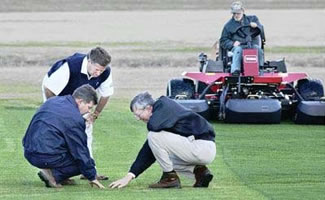Phillip Jennings Supplies Turf for Super Bowl
by RUSS BYNUM, Associated Press WriterA four-acre field will be cut into rolled sheets and taken by truck to Jacksonville
RIDDLEVILLE, GA. — Watching the grass grow has been anything but boring for Phillip Jennings, who for more than a year has been fussing and fretting over every blade, bug and brown spot on a special four-acre field.
He even has a backup plot with the same mix of Bermuda grass, perennial ryegrass and Kentucky bluegrass that he planted at an undisclosed location on his 3,000-acre farm.
Jennings figures he can't be too cautious. His crop will be the turf for the Feb. 6 Super Bowl.
"What if an F-15 crashes out here?" Jennings said, noting that Air Force fighters frequently fly over his land in central Georgia . "You've got to have a backup. ... That's going to be center stage at one of the most important sporting events in the world."
On Jan. 6, tractor-pulled blades will cut the field into sheets 1 3/4 inches thick to be rolled like carpet and transported by truck to the Jaguars' Alltel Stadium in Jacksonville , Fla. , where the NFL will hold the Super Bowl. The work of Jennings and Georgia-based Pennington Seed, which is providing the grass seed for its third straight Super Bowl, already has won the approval of longtime NFL turf guru George Toma.
"We could have played on it in mid-November. It was ready to go in my book," said Toma, 75, who has prepared fields for all 39 Super Bowls. "If they didn't perform well, they'd have been out the door. They've performed excellent."
Because of the wear and tear of the regular season, the NFL replaces the host field for every Super Bowl played on natural sod to ensure teams have tiptop turf for pro football's showcase game.
So Alltel Stadium will get the makeover despite having been resodded down the center only last month. Even that new turf "couldn't shine the shoes of the sod we're putting in," Toma said.
Mowed daily to a precise height of three-quarters of an inch, the field at Jennings ' farm resembles an immaculately manicured fairway amid the cow pastures and cotton fields along Georgia Highway 231. But Super Bowl standards require more than grass that stays green in February.
The turf has to be tough enough to withstand repeated punctures from players' cleats without tearing apart -- not to mention the pregame punishment of halftime-show rehearsals that require moving a 22-ton stage.
Since the 2003 Super Bowl in San Diego , the NFL has used a base of hybrid Bermuda grass called Princess 77, developed for Pennington Seed by New Mexico State University researchers in 1995.

